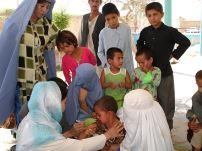 A child receives a measles vaccination during WHO's post-disaster campaign in flood-affected provincesKabul 23 July 2014 – WHO and the Ministry of Public Health (MoPH) with other partners have completed a post-disaster measles vaccination campaign in provinces affected by severe flooding in April-May this year.
A child receives a measles vaccination during WHO's post-disaster campaign in flood-affected provincesKabul 23 July 2014 – WHO and the Ministry of Public Health (MoPH) with other partners have completed a post-disaster measles vaccination campaign in provinces affected by severe flooding in April-May this year.
Overall, 321 750 children aged between nine months and nine years have been vaccinated against measles in 13 districts in five provinces devastated by flooding in the northern and north-eastern parts of Afghanistan. Hundreds of people lost their lives in the flash floods and landslides that also brought about immense destruction to houses, public infrastructure, crops and livestock and resulted in large-scale displacement.
Vaccination of infants and children against measles is among the most important public health response measures after disasters as the risk for measles outbreaks increases. Measles is a highly contagious viral disease affecting mostly children, and it can cause serious complications, including blindness, severe diarrhoea, ear infection and pneumonia, particularly in malnourished children and people with reduced immunity.
Measles and the risk for transmission after a natural disaster are dependent on baseline immunization coverage among the affected population. “Mortality due to measles is very high and the disease is highly contagious. The vaccine also does not guarantee 100% immunity to the disease,” says Dr Abdulghafoor Abdulshakoor, manager of the Extended Programme on Immunization (EPI) at WHO. Population displacement, crowded living conditions, the availability of safe water and sanitation facilities, the underlying health status of the population and availability of health care services all impact the risk for communicable disease outbreaks after disasters such as the ones that hit Afghanistan this spring.
WHO’s post-disaster campaign was successful as 92% of the initial targets were met. “We trained around 2000 health workers, supervisors and volunteers from the Ministry and nongovernmental organizations to properly plan, manage, deliver, monitor and evaluate measles campaigns,” says Dr Abdulshakoor. “This campaign specifically targeted districts with low routine measles immunization overage and high risk for measles outbreaks.”
WHO will expand its measles vaccination campaign in August to additional 43 high-risk districts where measles cases are reported. Measles remains one of the major causes of disease epidemics in Afghanistan and there is a need for accelerated efforts on mass measles vaccination campaigns, as well as focused outbreak response.


